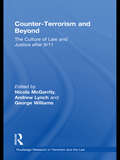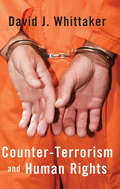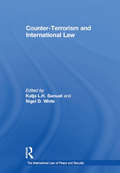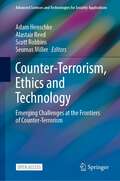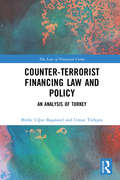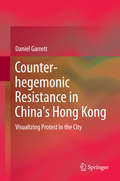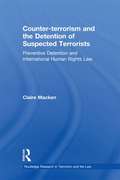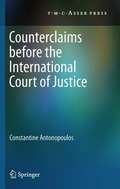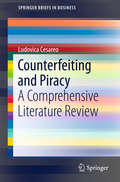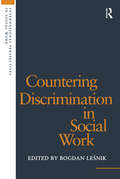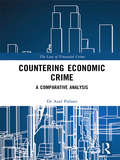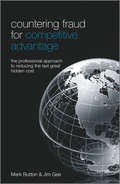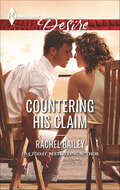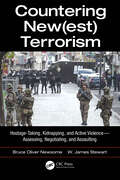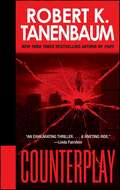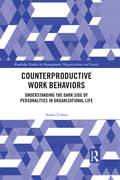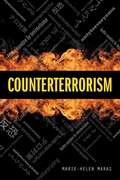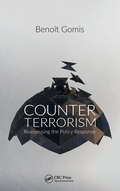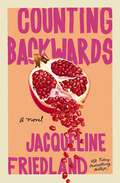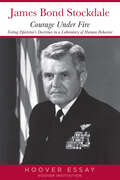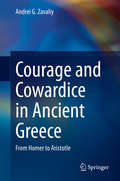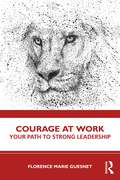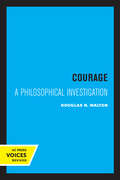- Table View
- List View
Counter-Terrorism Strategies In A Fragmented International Legal Order
by Larissa van den Herik Nico SchrijverFew events have influenced our global order as intensely as the events of September 11, 2001. At various levels in the past ten years, persistent attempts have been made to address the threat of terrorism, yet there is still urgent need for a joint and coherent application of a variety of regulations relating to international criminal justice co-operation, the use of force and international human rights law. In an important contribution to international discourse, Larissa van den Herik and Nico Schrijver examine the relationship between different branches of international law and their applicability to the problem of terrorism and counter-terrorism. Using a unique combination of academic perspectives, practitioners' insights and a comprehensive three-part approach, Counter-terrorism Strategies in a Fragmented International Legal Order offers sound policy recommendations alongside thorough analysis of the state of international law regarding terrorism and provides fresh insights against the backdrop of recent practice.
Counter-Terrorism and Beyond: The Culture of Law and Justice After 9/11 (Routledge Research in Terrorism and the Law)
by Nicola McGarrityThis book considers the increasing trend towards a ‘culture of control’ in democratic countries. The post-9/11 counter-terrorism laws in nations such as the USA, the UK, Canada and Australia provide a stark demonstration of this trend. These laws share a focus on the pre-emption of crime, restrictions on the right to liberty of non-suspects, limited public access to information, and increased community surveillance. The laws derogate, in many respects, from the ordinary principles of the criminal justice system and fundamental human rights while also harnessing public institutions in the broader project of prevention and control. Distinctively, the contributors to this volume focus on the impact of these laws outside of the counter-terrorism context. The book draws together a range of experts in both public and criminal law, from Australia and overseas, to examine the effect of counter-terrorism laws on public institutions within democracies more broadly. Issues considered include changes to the role and functions of the courts, the expansion of executive discretion, the seepage of extraordinary powers and pre-emptive measures into other areas of the criminal law, and the interaction and overlap between intelligence and law enforcement agencies. Counter-Terrorism and Beyond: The Culture of Law and Justice After 9/11 will be of interest to students and scholars of criminal law, criminology, comparative criminal justice, terrorism and national security, public law, human rights, governance and public policy.
Counter-Terrorism and Human Rights
by David J. WhittakerThe ever-present threat of terrorism and the growing human-rights backlash against anti-terrorist policies are becoming ever more significant on the international stage. Constant media-coverage and public concern have characterised the debate over the last ten years.This book is a fair and objective assessment of counter-terrorist policy and human rights worldwide, and covers a wide breadth of international material. While raising key questions for reader consideration, this book aims for straight-forward consideration, leaving polemic to the reader.
Counter-Terrorism and International Law: Conflicting Or Cooperative Legal Orders? (The International Law of Peace and Security)
by Katja L.H. SamuelThe articles and essays in this volume consider the problem of international terrorism from an international legal perspective. The articles address a range of issues starting with the dilemma of how to reach agreement on what constitutes terrorism and how to encapsulate this in a legitimate definition. The essays move on to examine the varied responses to terrorism by states and international organisations. These responses range from the suppression conventions of the Cold War, which were directed at criminalising and punishing various manifestations of terrorism, to more coercive, executive-led responses. Finally, the articles consider the role of the Security Council in developing legal regimes to combat terrorism, for example by the use of targeted sanctions, or by general legislative measures. An evaluation of the contribution of the sum of these measures to the goals of peace and security as embodied in the UN Charter is central to this collection.
Counter-Terrorism, Ethics and Technology: Emerging Challenges at the Frontiers of Counter-Terrorism (Advanced Sciences and Technologies for Security Applications)
by Seumas Miller Adam Henschke Alastair Reed Scott RobbinsThis open access book brings together a range of contributions that seek to explore the ethical issues arising from the overlap between counter-terrorism, ethics, and technologies. Terrorism and our responses pose some of the most significant ethical challenges to states and people. At the same time, we are becoming increasingly aware of the ethical implications of new and emerging technologies. Whether it is the use of remote weapons like drones as part of counter-terrorism strategies, the application of surveillance technologies to monitor and respond to terrorist activities, or counterintelligence agencies use of machine learning to detect suspicious behavior and hacking computers to gain access to encrypted data, technologies play a significant role in modern counter-terrorism. However, each of these technologies carries with them a range of ethical issues and challenges. How we use these technologies and the policies that govern them have broader impact beyond just the identification and response to terrorist activities. As we are seeing with China, the need to respond to domestic terrorism is one of the justifications for their rollout of the “social credit system.” Counter-terrorism technologies can easily succumb to mission creep, where a technology’s exceptional application becomes normalized and rolled out to society more generally. This collection is not just timely but an important contribution to understand the ethics of counter-terrorism and technology and has far wider implications for societies and nations around the world.
Counter-Terrorist Financing Law and Policy: An analysis of Turkey (The Law of Financial Crime)
by Burke Uğur Başaranel Umut TürkşenSince the 9/11 attacks the world has witnessed the creation of both domestic and international legal instruments designed to disrupt and interdict the financial activities of terrorists. This book analyses the counter-terrorist financing law (CTF), policy and practice at the national level, focusing on Turkey. The work examines the limits and capabilities of CTF efforts on terrorism threats and determines the effectiveness of CTF efforts in Turkey, a country which has a pivotal role in terms of countering terrorism regionally and internationally. <P><P>The Turkish case-study is supported by an empirical study involving 37 semi-structured interviews with CTF practitioners and law enforcement experts with different affiliations and backgrounds. The findings illustrate that Turkey’s CTF system has not obtained an adequate level of effectiveness as a result of lack of proper implementation of its policy in the bureaucratic, legal and operational spheres. It is evident that the administrative and legal systems in Turkey are established according to the ‘one-size-fits-all’ international CTF standards and thus are compliant with the international CTF benchmarks, yet the interviews reveal significant challenges at the implementation level including lack of training and financial security, heavy handed bureaucracy, inadequate coordination and communication between international and national levels. <P><P>The book will be an invaluable resource for academics, students and policy-makers working in the areas of financial crime and terrorism.
Counter-hegemonic Resistance in China's Hong Kong: Visualizing Protest in the City
by Daniel GarrettThis book and associated collection of visual data and sociological observations examine how the Hong Kong Special Administrative Region (SAR) has been visually re-imagined, transformed, and utilized by its subalterns in the post-Handover period to reproduce their aspirations and demands for greater democracy and social justice while simultaneously contesting the hegemonic pressure exerted by China under the "One Country, Two Systems" ideology. It provides a rich visual description and narrative of how Hong Kong's many repressed social and political actors have struggled to make their voices heard under its competitive authoritarian political system. The book addresses the growing scholarly interest in the visual analysis of global protests and social movements as salient sources of sociological data and on the creation of meaning. By innovatively tackling the visual culture and visuality of subaltern resistance in Hong Kong it contributes to our understanding of contentious SAR-China politics and the New Social Movement, and will be of great interest to Hong Kong, resistance, social movement, and visual studies scholars.
Counter-terrorism and the Detention of Suspected Terrorists: Preventive Detention and International Human Rights Law (Routledge Research in Terrorism and the Law)
by Claire MackenIn a regional, national and global response to terrorism, the emphasis necessarily lies on preventing the next terrorist act. Yet, with prevention comes prediction: the need to identify and detain those considered likely to engage in a terrorist act in the future. The detention of ‘suspected terrorists’ is intended, therefore, to thwart a potential terrorist act recognising that retrospective action is of no consequence given the severity of terrorist crime. Although preventative steps against those reasonably suspected to have an intention to commit a terrorist act is sound counter-terrorism policy, a law allowing arbitrary arrest and detention is not. A State must carefully enact anti-terrorism laws to ensure that preventative detention does not wrongly accuse and grossly slander an innocent person, nor allow a terrorist to evade detection.This book examines whether the preventative detention of suspected terrorists in State counter-terrorism policy is consistent with the prohibitions on arbitrary arrest and detention in international human rights law. This examination is based on the ‘principle of proportionality’; a principle underlying the prohibition on arbitrary arrest as universally protected in the Universal Declaration of Human Rights, and given effect to internationally in the International Covenant on Civil and Political Rights, and regionally in regional instruments including the European Convention on Human Rights. The book is written from a global counter-terrorism perspective, drawing particularly on examples of preventative detention from the UK, US and Australia, as well as jurisprudence from the ECHR.
Counterclaims before the International Court of Justice
by Constantine AntonopoulosCounterclaims, the right of a State sued by another State to bring its own counter-suit in the course of the same trial, may offer an opportunity to mitigate the effects of the original suit and help to resolve disputes between States that have more than one aspect. In recent years, counterclaims have been frequently presented at the International Court of Justice (ICJ). This book examines the counterclaims presented at the ICJ and at its predecessor, the Permanent Court of International Justice (PCIJ), during its 65 years of existence. It is the first study that focuses exclusively on the subject of counterclaims. It analyses the evolution of the germane provisions in the PCIJ and ICJ Rules of Procedure and the practice of the Court, especially in light of the relevant case-law of the ICJ. A useful source for academics and practitioners in International law.
Counterfeiting and Piracy: A Comprehensive Literature Review (SpringerBriefs in Business)
by Ludovica CesareoThis book aims to identify, analyze, and systematize the available research on counterfeiting and piracy published over a thirty-five year time span (1980-2015) in order to highlight the main trends in the illicit trade literature, propose suggestions for managers battling against illicit trade, and provide a starting point for future research. Counterfeiting and piracy, i. e. , the violation of intellectual property rights (IPRs), including trademarks, copyright, and patents, have been investigated across a multitude of fields, from ethics to marketing, from law to business, from criminology to psychology. While the number of contributions has been substantial, research on both demand and supply has been fragmented and has at times yielded contradictory results. In addition, the lack of an extensive, interdisciplinary, and up-to-date literature review has made it hard to fully understand what aspects of the phenomenon need further clarification in order to stem consumer demand and provide meaningful suggestions to companies combatting illicit trade daily. A systematization of the existing literature is absolutely paramount and this need is fully met by this book.
Countering Discrimination in Social Work (International Perspectives in Social Work)
by Bogdan LešnikDiscrimination? Isn't there enough talk about discrimination? Yes, indeed. That is why we have to begin countering discrimination. We need strategies that will make it inoperative or at least limit its scope. But first, we need to think how discrimination works and identify it where it works. It concerns far more than mere procedural hitches for which a few legal provisions will do. Countering Discrimination (Volume 1998 of International Perspectives in Social Work yearbook) brings papers that analyse mechanisms of social discrimination in a variety of such locations and bring proposals for counter-strategies. This is essential in social work if causes, rather than manifestations, of the problems it is concerned with are to be addressed. But it is also essential that everybody who opposes discrimination recognise its subtle and dispersed ways of operation in the human services, regardless of their own basic field of work. In this respect, the book will be useful to a very wide audience.
Countering Economic Crime: A Comparative Analysis (The Law of Financial Crime)
by Axel PalmerEconomic crime is a significant feature of the UK’s economic landscape and yet despite the government’s bold mission statements ‘to hold those suspected of financial wrongdoing to account’ as part of their ‘day of reckoning’ and ‘serious about white-collar crime’ agenda, there is a sense that this is still not being done effectively. This book examines the history of the creation of the UK’s anti-economic crime institutions and accompanying legislation, providing a critique of their effectiveness. The book analyses whether the recent regulatory regime is fit for purpose as well as being appropriate for the future. In order to explore how the UK’s economic crime strategies could be improved the book takes a comparative approach analysing policy and legislative responses to economic crime in the United States and Australia in order to determine whether the UK could or should import similar structures or laws to improve the enforcement of UK economic crime.
Countering Fraud for Competitive Advantage
by Mark Button Jim GeeSubstantially reduce the largely hidden cost of fraud, and reap a new competitive advantage. As the title suggests, Countering Fraud for Competitive Advantage presents a compelling business case for investing in anti-fraud measures to counter financial crime. It looks at the ways of reaping a new competitive advantage by substantially reducing the hidden cost of fraud. Aimed at a wide business community and based on solid research, it is the only book to put forward an evidence-based model for combating corporate fraud and financial crime. Despite its increase and capture of the news headlines, corporate fraud is largely ignored by most organizations. Fraud is responsible for losses of up to nine percent of revenues--sometimes more. Yet, most organizations don't believe they have a problem and don't always measure fraud losses. This highlights an area for capturing a competitive advantage--with the right counter-fraud strategy, massive losses due to the cost of fraud can be reduced for a fraction of the return. Advocates a new model for tackling fraud and illustrates theories with best practice examples from around the world The authors have close links with the Counter Fraud Professional Accreditation Board: Jim Gee is a world-renowned expert in the field, and has advised private companies and governments from more than 35 countries. Mark Button is Director of the leading Centre for Counter Fraud Studies, Portsmouth University, U.K. Organizations are losing millions of dollars to fraud. This book outlines a comprehensive approach to reducing financial crime and helping return some of the revenue lost to the cost of fraud.
Countering His Claim
by Rachel BaileyPassion sets sail in USA TODAY bestselling author Rachel Bailey's tale of high-stakes inheritance Never be distracted by a woman is hotel magnate Luke Marlow's golden rule, especially when the woman just inherited half his late uncle's luxury cruise liner. But ship's doctor Della Walsh is the exception. Her dignified beauty ignites Luke's desire despite his suspicions. Even so, he will gain full control of the ship at all costs. For Della, the ship has been a sanctuary. Now she has just three weeks to change Luke's mind and save the ship-until passion comes along and steers them off course....
Countering New(est) Terrorism: Hostage-Taking, Kidnapping, and Active Violence — Assessing, Negotiating, and Assaulting
by Bruce Oliver Newsome James W. StewartHow should we analyze and assess new terrorist behaviors? What are the particular risks and challenges from new terrorism? Should we negotiate with terrorists, and, if so, how? When should we use force against terrorists? Countering New(est) Terrorism: Hostage-Taking, Kidnapping, and Active Violence—Assessing, Negotiating, and Assaulting improves our knowledge of new terrorist behaviors, and our skills in responding to such attacks.The term "new terrorism" has been in circulation since the late 90’s. This book analyzes the "newest terrorism" that has emerged in recent years—characterized by increased hostage-taking, kidnapping, and active violence—and develops best practices for countering these emerging threats. Along the way, it challenges fashionable wishful thinking that all terrorists are open to rational negotiation or de-radicalization, that military responses always reflect badly on the official side, and that terrorists are not constrained by their own doctrines.The new terrorists are dramatically more ideological, murderous, and suicidal. They are generally less reconcilable, less trusting of official negotiators, less likely to release detainees, and more likely to kill detainees. They are less likely to demand ransoms yet more likely to release hostages in cases in which they do demand ransom. They are more informed about the official side’s policies, tactics, techniques, and procedures. They are more likely to use new information and communication technologies against responding agencies and officials. They are more capable fighters—they kill more people despite deploying fewer fighters per hostage. Most disturbing is the fact that they take advantage of free-er societies to access easier targets. Features: Includes evidence-based definitions and descriptions of political, religious, Jihadi, and new terrorism Presents the first large-n comparison of old and new terrorism, using an original extension of the Global Terrorism Database (GTD), with added codes for each of 10,735 hostage crises and more than 500,000 data points from 1970 through 2016 Details a further extension of the GTD covering all terrorist events from 2004 through 2016, roughly 5 million data points. Offers prescriptive advice and visual decision trees on how to negotiate crises, assess the risk of terrorism, and how and when to assault terrorists Reviews official practices, interviews with experienced officials, and real-world simulations of recent terrorist events and attacks Countering New(est) Terrorism will be of interest to researchers, students enrolled in terrorism and Homeland Security programs, crisis negotiators, and police, security, intelligence, and military authorities tasked with counterterrorism and anti-terrorism efforts.
Counternetwork: Countering the Expansion of Transnational Criminal Networks
by Douglas Farah Peter Chalk Angel Rabasa Howard J. Shatz Gregory Midgette Christopher M. SchnaubeltThrough an analysis of transnational criminal networks originating in South America, this report presents operational characteristics of these networks, strategic alliances they have established, and the multiple threats that they pose to U.S. interests and to the stability of the countries where they operate. It also identifies U.S. government policies and programs to counter these networks and examines the military’s role in that context.
Counterplay (A Butch Karp-Marlene Ciampi Thriller #18)
by Robert K. TanenbaumTanenbaum's last novel, Fury, ended with a breathtaking cliff-hanger. Now readers can enjoy the exciting conclusion -- bursting with more suspenseful twists -- in his latest, Counterplay. When betrayal results in the cold-blooded murder of a busload of schoolchildren to accomplish the escape from custody of vicious sociopath Andrew Kane, New York District Attorney Butch Karp finds himself embroiled in a raging quest for vengeance that could cost him, his family, and thousands of others their lives. With an intensive manhunt ongoing for the fugitive Kane, Karp and long-time colleague Ray Guma open a cold case and pursue murder charges against wealthy Manhattan power broker/banker Emil Stavros, whose socialite wife disappeared nearly fifteen years earlier. Meanwhile, Karp's wife, Marlene Ciampi, has let her fascination with her husband's lesser-known family comprised of Russian gangsters pull her into a dangerous world of Islamic terrorists, Chechen rebels, and Russian agents engaged in nefarious events straight out of today's real-world headlines. Yet again, Robert K. Tanenbaum writes a masterful thriller involving the most memorable -- and "un-put-downable" -- stories of corruption and courtroom confrontations. Counterplay, the latest book in the bestselling Butch Karp/Marlene Ciampi series, proves to be another full-bodied, riveting page-turner with yet another cliff-hanger not soon to be forgotten.
Counterproductive Work Behaviors: Understanding the Dark Side of Personalities in Organizational Life (Routledge Studies in Management, Organizations and Society)
by Aaron CohenThere has been a growing interest among scholars in the fields of organizational behaviour and industrial psychology in what can be termed "the dark side of the organizations." A main concept in this regard this is both important and relevant counterproductive work behaviours (CWBs), which can be defined as deliberate actions that harm the organization or its members. These behaviours include a variety of acts that can be directed toward organizations (CWB-O) or toward other people (CWB-P). Destroying organizational property, purposely doing work incorrectly, and taking unauthorized work breaks are examples of CWB-O, whereas hitting a co-worker, insulting others, and shouting at someone are forms of CWB-P. Despite the growing interest in CWBs as a research issue, not enough is known about the determinants of CWBs. The goal of Counterproductive Work Behaviors therefore is to cover this stimulating, important, and innovative issue of dark triad personalities in the workplace. The book will deal with important aspects of this issue, such as the characteristics of dark triad personalities, how they operate and damage organizations, what organizations are more vulnerable to them, ways to diagnose and detect them, and ways to handle dark triad personalities and prevent them from harming organizations and employees. There is no doubt that the issues covered by Counterproductive Work Behaviors will continue to attract academic attention and therefore the book is essential reading for researchers, academics and business professionals alike in the fields of Organizational Studies and Behaviour, Organizational Psychology, Strategy, Human Resource Management, Leadership and the related disciplines.
Counterterrorism
by Marie-Helen MarasTo fully comprehend the evolution and current state of terrorism, students must look at its history on a global scale. This full-view understanding enables students to think sensibly about terrorism and better understand effective, and equally important, ineffective measures within counterterrorism. Appropriate for undergraduate and graduate-level courses in criminal justice and homeland security, as well as political science and sociology departments, Counterterrorism focuses on domestic terrorist groups from Europe, Asia, Africa, the Middle East, South America, and North America. It offers critical evaluation of the counterterrorism measures implemented in response to these terrorist groups. <p><p> Using a multidisciplinary approach, this comprehensive resource compares terrorist groups, assesses the factors that are conducive to certain groups’ sustainability and those that led to other groups’ demise, and notes measures that were successfully used in the past to combat terrorists and terrorist groups worldwide. This text also incorporates efficient policies into a strategy that can be used to effectively contend with the current threat of terrorism by al-Qaeda operatives, affiliates, and homegrown terrorists inspired by al-Qaeda’s cause. <p> Key Features: -Employs an international scope and multi-group approach to provide students with a full understanding of terrorism and terrorist groups, not simply al-Qaeda. -Provides comprehensive coverage of the theory behind terrorists' motivations and actions for students to grasp how and why terrorist groups act as they do. -Contains boxes with case studies corresponding to the material as well as "Food for Thought" sections throughout, offering interesting research topics and questions on counterterrorism practices. -Includes end-of-chapter review questions and hypothetical terrorist scenarios which test students on their comprehension of the section material and confirm that they understand terrorist groups' goals, capabilities, tactical profile, targeting pattern, and operational area, and the appropriateness of selected measures to counter these threats.
Counterterrorism: Reassessing the Policy Response
by Benoît GomisCounterterrorism: Reassessing the Policy Response promotes a more nuanced understanding of the effectiveness of current counterterrorism practices and the need for reform. It challenges government, media, and academic accounts that exaggerate terrorist threats, particularly in comparison to other threats such as organized crime. Author Beno�Gomis r
Counting Backwards: A Novel
by Jacqueline Friedland"Jacqueline Friedland's ripped-from-the-headlines story is an Erin Brockovich for our times." --Jill Santopolo, New York Times bestselling author of The Light We Lost". . . a riveting, compelling story--but it's also an important one, reminding us that history's darkest aspects can echo forward into our present day and that there is so much work left to do in the fight for freedom and equality." --Kelly Rimmer, New York Times bestselling author of The German WifeA routine immigration case, a shocking legacy. Jessa Gidney's quest for justice draws her into the heart of an abhorrent conspiracy. As she uncovers her personal ties to a heartbreaking past, her life takes a dramatic turn, in this emotionally riveting novel inspired by true events.New York, 2022. Jessa Gidney is trying to have it all--a high-powered legal career, a meaningful marriage, and hopefully, one day, a child. But when her professional ambitions come up short and Jessa finds herself at a turning point, she leans into her family's history of activism by taking on pro bono work at a nearby ICE detention center. There she meets Isobel Pérez--a young mother fighting to stay with her daughter--but as she gets to know Isobel, an unsettling revelation about Isobel's health leads Jessa to uncover a horrifying pattern of medical malpractice within the detention facility. One that shockingly has ties to her own family.Virginia, 1927. Carrie Buck is an ordinary young woman in the center of an extraordinary legal battle at the forefront of the American eugenics conversation. From a poor family, she was only six years old when she first became a ward of the state. Uneducated and without any support, she spends her youth dreaming about a different future--one separate from her exploitative foster family--unknowing of the ripples her small, country life will have on an entire nation.As Jessa works to assemble a case against the prison and the crimes she believes are being committed there, she discovers the landmark Supreme Court case involving Carrie Buck. Her connection to the case, however, is deeper and much more personal than she ever knew--sending her down new paths that will leave her forever changed and determined to fight for these women, no matter the cost.Alternating between the past and present, and deftly tackling timely-yet-timeless issues such as reproductive rights, incarceration, and society's expectations of women and mothers, Counting Backwards is a compelling reminder that progress is rarely a straight line and always hard-won. A moving story of two remarkable women that you'll remember for years to come.
Courage Under Fire: Testing Epictetus's Doctrines in a Laboratory of Human Behavior (Hoover Institution Press Publication #6)
by James B. StockdaleWhen physical disability from combat wounds brought about Jim Stockdale's early retirement from military life, he had the distinction of being the only three-star officer in the history of the navy to wear both aviator wings and the Congressional Medal of Honor. His writings have been many and varied, but all converge on the central theme of how man can rise with dignity to prevail in the face of adversity.
Courage and Cowardice in Ancient Greece: From Homer to Aristotle
by Andrei G. ZavaliyThe book offers the first comprehensive account of the debate on true courage as it was raging in ancient Greece, from the times when the immensely influential Homeric epics, the Iliad and the Odyssey, were composed, to the period of the equally influential author, Aristotle. The many voices that contribute to this debate include poets, authors of ancient dramas and comedies, historians, politicians and philosophers. The book traces the origin of the earliest ideal of a courageous hero in the epic poems of Homer (8th century BCE), and faithfully records its transformations in later authors, which range from an emphatic denial of the Homeric standards of courage (as in comedies of Aristophanes and some Dialogues of Plato) to the strong revisionist tendencies of Aristotle, who attempts to restore genuine courage to its traditional place as an exclusively martial, male virtue.Without attempting to cover the whole of the Western history, the book is able to explore the most important primary Greek sources on the subject matter in greater details, and provide the reader with a comprehensive picture of the changes in both popular and philosophical conceptualizations of the standards of courage from the Archaic period to the middle of the 4th century BCE. A deeper understanding of the history of the debate on courage should help to shape the modern discussions as well, as it becomes obvious that many of the questions on courage and cowardice that are still raised by the contemporary authors from different fields, have been thoroughly considered during the early stages of Greek culture. The book seeks to undermine a common stereotype of a single, unified view on courage and cowardice in Ancient Greece and shows that the current debates on what constitutes genuine courageous character can be traced to the various direct and indirect discussions on this subject matter by the ancient authorities.
Courage at Work: Your Path to Strong Leadership
by Florence GuesnetCourage can shape our lives, as well as the workplace and business outcomes. Willingness and ability to take risks make space for major decisions. And it’s more than something to admire in others: courage can be learned, and this book will teach you.Building on examples from a 30‑year international career in marketing, coaching, and political activism, Florence Guesnet introduces the pioneering concept of the "courage zone." This shifts courage from unattainable heroism to a competence that can be built with five steps: recognize fear, perceive your heart’s desires, analyze reality, make a decision, and take the step. The book begins by strengthening the reader’s courage as an individual, inspiring a bold mindset and vision, and including hands‑on exercises. The book then goes on to show readers how to carry their courage into organizations and inspire others, addressing questions of governance, strategy, and everyday team encouragement against the backdrop of 21st century demands and typical paralyzing fears.Current and aspiring leaders in small, medium to large organizations will be empowered to take risks, surmount obstacles, and grab opportunities with this book’s effective tools to build courage in themselves and their teams.
Courage: A Philosophical Investigation
by Douglas N. WaltonThis title is part of UC Press's Voices Revived program, which commemorates University of California Press’s mission to seek out and cultivate the brightest minds and give them voice, reach, and impact. Drawing on a backlist dating to 1893, Voices Revived makes high-quality, peer-reviewed scholarship accessible once again using print-on-demand technology. This title was originally published in 1986.

